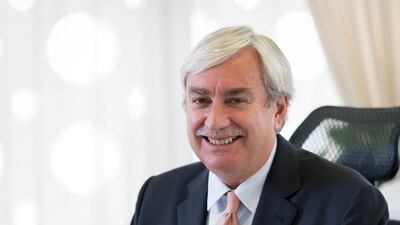National Bank of Bahrain, the kingdom's flagship lender, plans to grow its presence in neighbouring Gulf states including in Saudi Arabia, with a view to focusing on mid-size clients, its chief executive said.
“This business segment requires more intimate knowledge [of each customer],” said Jean-Christophe Durand, a three decade industry veteran in the region, who aims to use the lender’s strengths with mid-size clients to offer customers in the kingdom and the UAE a dedicated option. “They really need their bankers to know them and they expect advice from them.”
NBB currently has a branch in each of Saudi and Abu Dhabi and is waiting for regulatory approval to open a Dubai branch. The Saudi regulator limits foreign banks to a single branch but there is hope that widespread reforms aimed at weaning the kingdom off of its reliance on oil revenues could soon include further opening up the banking sector.
The ‘know each customer well’ approach needed for the mid-size segment is in line with Mr Durand's overall personal philosophy on what a banker should offer. It’s an attitude that he hopes will help the lender as it expands in the region, providing support for cross-border transactions, especially in and out of Bahrain.
Strong bilateral relations between Bahrain and Saudi Arabia underpin NBB’s goal of building on its decade long presence in the Arab world's largest economy.
“There is room in Riyadh for a Bahrain bank to capitalise on this,” said Mr Durand. NBB has recently appointed a new branch head in Saudi to reflect its ambitions.
NBB reported a record operating profit growth of seven per cent for 2017.
“The country’s economy has done rather well,” said Mr Durand who was formerly with BNP Paribast. The uptick in performance started before the rebound in oil prices, which collapsed in 2014, and is rooted in the diversification policies of that aim to lessen dependency on oil related sectors, in addition to foreign direct investment. A new airport terminal project is being backed by funding from neighbouring Abu Dhabi, for example.
According to the Bahrain Economic Development Board GDP expanded 3.4 per cent in the first half of last year. In August, the IMF forecast that Bahrain’s real GDP growth would slow to 2.3 per cent and 1.6 per cent in 2017 and 2018, reflecting ongoing fiscal consolidation and weaker investor sentiment.
GDP growth is likely to also be slightly impacted as a result of fiscal consolidation, and other reform measures that include the introduction of a GCC-wide 5 per cent value added tax (VAT).
NBB is preparing for the introduction of VAT in Bahrain, following implementation this year by the UAE and Saudi.
“Having branches in countries that are using VAT meant we had to [get ready for VAT] anyway...but it will happen soon [in Bahrain too],” said Mr Durand.
Since taking over at the end of 2016, he has taken the lender on a path towards a greater emphasis on digital banking, which includes a review of its branches and services.
“We have embarked on a journey, it’s a beginning. We are assessing our priorities, assessing a base from where to start. It’s not a question of whether we are going to do it, we are moving,” said Mr Durand. “If we don’t transform ourselves to the level of service and products which our clients of the future expect, we will lose ground.”


